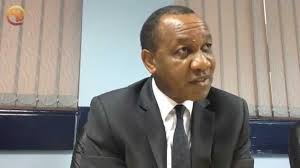University of Malawi economist professor Ben Kaluwa has expressed concern over rising external debt, saying it has the potential to destabilize the economy and burden future generations.
His comments come in the wake of a World Bank report which shows that the country’s external debt stock continues to rise with fresh figures indicating an increase to $2.2 billion (about K1.6 trillion) from $2.1 billion (about K1.5 trillion) the prior year.
The World Bank’s International Debt Statistics 2020—a compilation of statistics covering external debt stock of low and middle-income countries—shows that long- term external debt stock rose to $1.9 billion (about K1.4 trillion) from $1.8 billion (K1.3 trillion)in 2017.
Interest payment on debt marginally increased to 16 percent from 15.7 percent, a situation which puts the economy at risk as resources are going to service debt.
Kaluwa, who teaches economics at Chancellor College, said that if government continues to borrow it means there is an increased burden on the future generations and the economy at large.
“The fear is that soon debt will reach uncontrollable levels and we back those ‘bad’ times when interest rates, inflation rate, the exchange rate were at unimaginable levels,” said Kaluwa.
Meanwhile, Treasury figures contained in budget document number three indicate that for the 2019/20 fiscal year, payment of interest on the country’s public debt is projected at K243.9 billion or 3.9 percent of gross domestic product (GDP), representing 8.8 percent increase from last financial year.
Of this total, K15.5 billion is for foreign interest payment while K228.5 billion is for domestic interest payment.
Minister of Finance, Economic Planning and Development Joseph Mwanamvekha is on record as having said that Treasury is facing challenges with fiscal deficits and public debt, with deficits contributing to rising public debt recorded at 62 percent of GDP as at end December 2018.
He said the 2019/20 fiscal plan has been prepared to reduce domestic borrowing to cut public debt as guided by the Medium Term Debt Strategy.
“The Medium Term Debt Strategy outlines measures that will translate into a reduction in domestic debt to 20 percent of GDP by 2023.
“Government recognizes that a reduction in domestic debt requires an increase in revenue and reduction in expenditure to create fiscal space for retiring debt,” he said in the 2019/20 Budget Statement presented in Parliament last month.
Malawi’s public debt has increased since the country got a relief of its external debt in 2006 under the Heavily Indebted Poor Country (HIPC) initiative, a development analysts say consumes about 15 percent of the national budget in interest payment alone.
Available figures show that Malawi has in the past decade spent over K123 billion on debt servicing required to cover the repayment of interest and principal on debt.
Subscribe to our Youtube Channel:


.jpeg&w=60&q=100&h=60)









